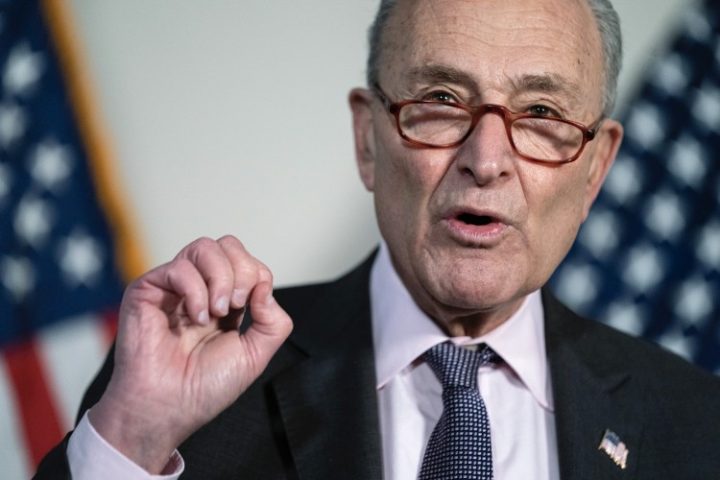
Democrat Party leadership and the increasingly aggressive progressive wing are on a collision course. Will either side win, or will both lose?
Senate Majority Leader Chuck Schumer (D-N.Y.) is about to find himself in the middle of a conflict as Democrat activists push for the caucus to take punitive action against Sens. Joe Manchin (W. Va.) and Kyrsten Sinema (Ariz.) for their roles in preventing the passage of sweeping legislation on climate change, social programs and voting changes.
Last week, Schumer appeared to leave the door open to denying support to Manchin and Sinema with the vague way in which he answered a question from the media about whether he would give them help in a future primary.
“I am focused on 2022, getting things done, and winning the election on 2022,” Schumer told CNN. “I’m not at all focused on 2024 right now, and neither should anyone else be. That’s just how you lose in 2022.”
The answer was surprising, given that Senate incumbents virtually always can count on the certain support from their own leadership.
A Democrat senator who desired anonymity told The Hill that Schumer’s hesitation to say whether he would support the two embattled senators “shows how disgruntled he is” with them.
According to the senator, Schumer wants to avoid dividing Democrats in his home state ahead of his own reelection bid this year. A second Democrat senator said Schumer may be seeking to avoid a confrontation with progressive activists.
Any signal of support for Manchin or Sinema could add to calls for Rep. Alexandria Ocasio-Cortez (D-N.Y.) to challenge Schumer in the primary, or at least weaken enthusiasm for him among Democrats and thereby erode his margin of victory during his reelection campaign.
Ocasio-Cortez has publicly supported the idea of getting behind a primary challenger to Sinema. The rising Democrat progressive hasn’t ruled out the possibility of running for Senate herself at some point.
Senator Bernie Sanders (I-Vt.), who caucuses with the Democrats and is a leader of the progressive wing, has also said he might support a challenge to either Sinema or Manchin.
Sanders is thus far the only member of the Senate Democratic Conference willing to say publicly that he backs a primary challenger to Sinema or Manchin.
Last month, Representative Ruben Gallego (D-Ariz.) said Senate Democrats have contacted him to encourage him to run against Sinema in 2024.
“To be honest, I have gotten a lot of encouragement from elected officials, from senators, from unions, from your traditional Democratic groups, big donors,” Gallego told CNN last month.
Faiz Shakir, a former Democrat leadership aide who now serves as a political advisor to Sanders, said the party is now being fought over by centrists like Manchin and Sinema and progressives like Sanders and Sen. Elizabeth Warren (D-Mass.).
“There’s an ongoing battle for the soul of Democratic Party, the future of it, whether we are a corporate-driven party or a party of the people and Joe Manchin and Sinema represent the leading faction of the push to be friendly to corporate power,” Shakir said.
He also called Sinema and Manchin “the symbol of that fight because they have so brazenly leaned into corporate donations and the willingness to fight Biden’s agenda.”
“They tarnish any Democrat who wants to work with them,” he added.
The Hill reports:
Manchin saw corporate donations to his political action committee, Country Roads PAC, surge during the fall, when he emerged as the biggest obstacle to Biden’s $2 trillion Build Back Better agenda.
His PAC received contributions in October and November from American Express, Goldman Sachs, Lockheed Martin, UnitedHealth Group, Blue Cross and Blue Shield, Verizon, Union Pacific and Wells Fargo.
Manchin raised more than $4.8 million in 2021, setting a non-election year personal fundraising record.
Sinema, meanwhile, raised more than $1.5 million at the end of 2021 and accepted contributions from billionaire investors Ken Langone and Nelson Peltz, who supported former President Trump in the past.
Warren on January 18 dodged the question of whether she would support a challenge to the two centrist Democrats.
“We’ll address that when we get past this week,” she said.
Senator Sheldon Whitehouse (D-R.I.), a leading proponent of the climate provisions in Build Back Better that stalled when Manchin turned against the package, said he and Democratic voters are frustrated with the negotiation’s outcome.
But he would not discuss the topic of primary challenges.
“I don’t talk about colleagues,” he said.
Yet even centrist senators like Mark Kelly (D-Ariz.) are reluctant to express outright support for Manchin or Sinema.
“I’m not even focused on an election that’s happening this November,” said Kelly, who is up for reelection this year, when asked if he would throw his support behind her in a 2024 primary.




